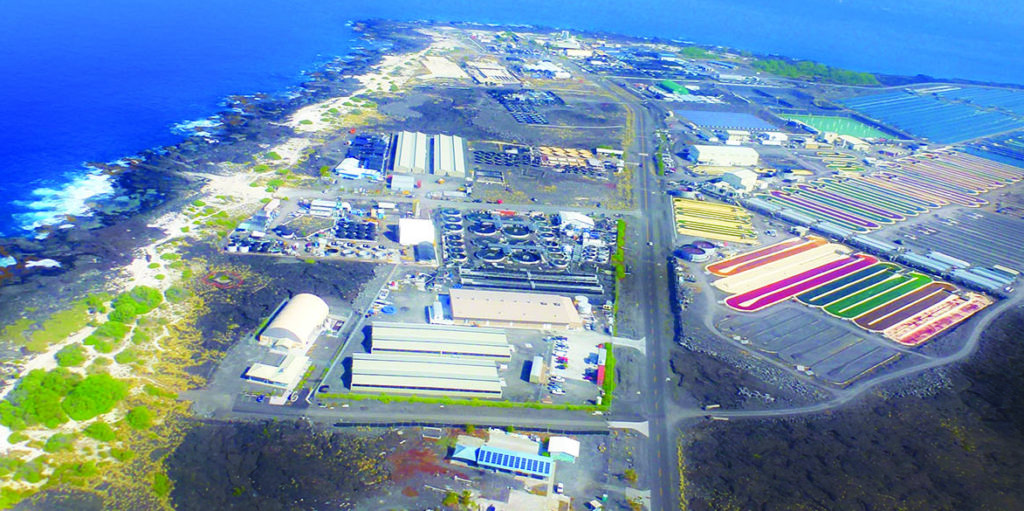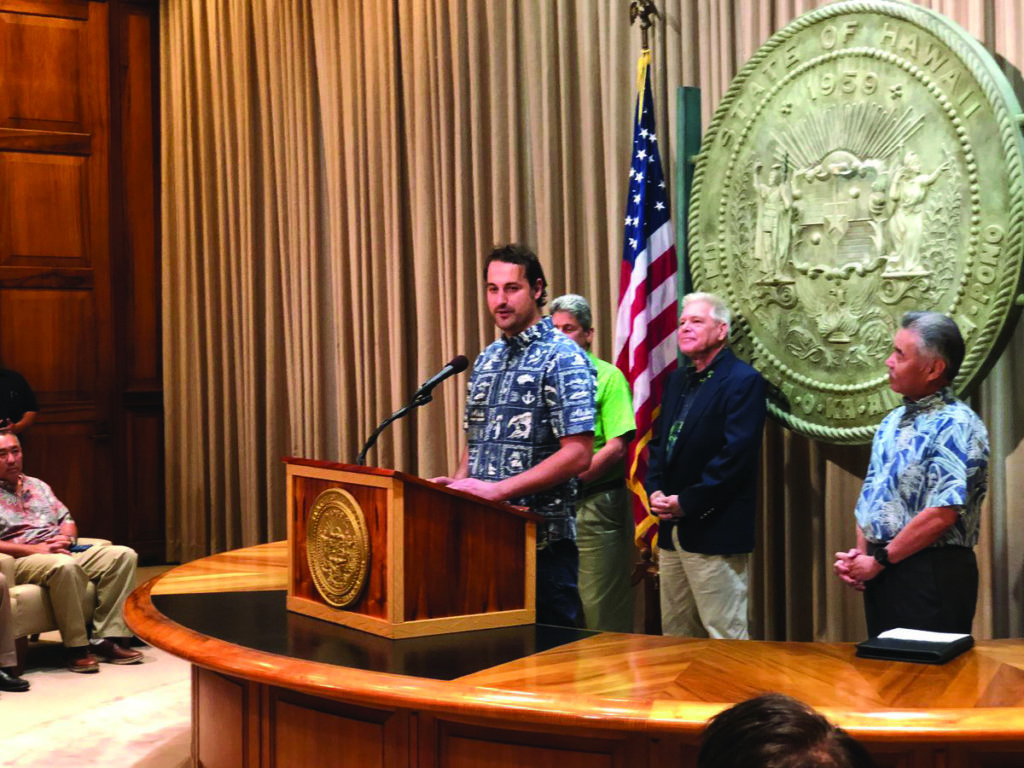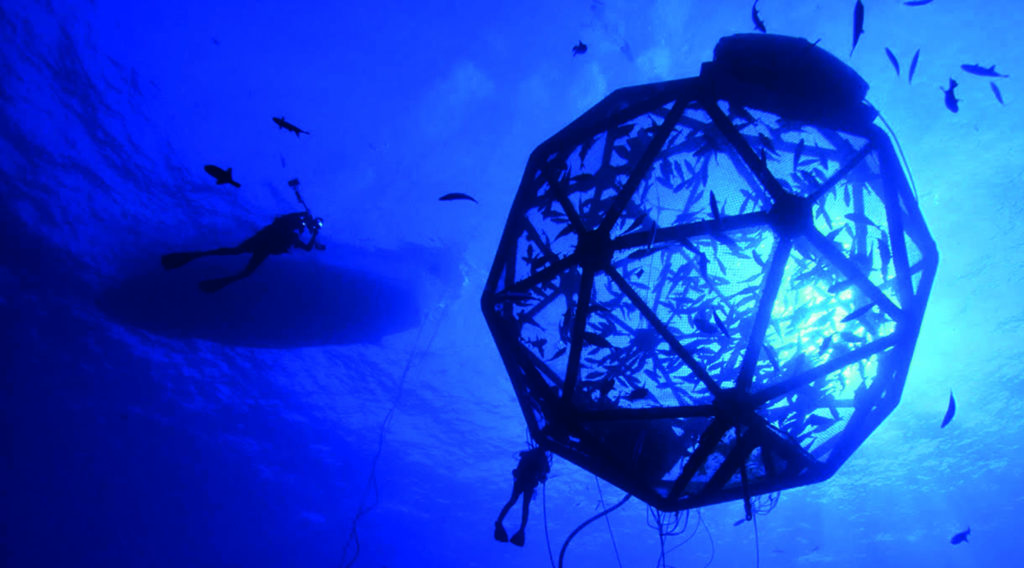By 2022, the global aquaculture market is expected to reach over $219 billion and by 2030, The World Bank estimates that 62 percent of consumable fish will be provided by aquaculture. Rising populations increasing wealth and new demand, particularly in emerging economies around the world—combined with diminishing wild fish numbers have put significant pressure on the aquaculture industry to fill the gap in the global food supply chain.
In the United States alone the numbers are quite astounding. According to facts provided by National Oceanic and Atmospheric Association in 2015, while American’s were the third largest consumer of seafood in the world, the U.S. imported 90 percent of it with more than 50 percent provided by aquaculture from other countries—but ranked just 16th in world aquaculture production. In Hawai‘i, a University of Hawai‘i Economic Research Organization report in 2013 indicated that of the 38.9 million pound average of commercially consumed seafood between 2000 and 2009, only 37 percent came from local waters. That may soon change, as the pristine waters off the Kailua-Kona Coast on Hawai‘i Island, world-renowned for its relative calm and some of the best sport fishing in the world, may become a hotbed of sustainable aquaculture innovation and technology in the Pacific, thanks to a unique partnership between the University of Hawai‘i (UH) and the State of Hawai‘i.

In April 2019, UH and the State of Hawai‘i, represented by the Hawaiʻi Strategic Development Corporation (HSDC) and the Natural Energy Laboratory of Hawaiʻi Authority (NELHA), jointly announced the formation of a new Hawai‘i-based aquaculture accelerator and investment fund based at the NELHA’s Hawaiʻi Ocean Science & Technology Park (HOST). Located north of Kailua-Kona, the sprawling 900-acre aquaculture innovation hub already has the necessary infrastructure of existing office and workspaces, and unique resources—including access to a continuous flow of clean, cold, unadulterated and nutrient-rich deep seawater that is pumped up from 3,000 feet twenty-four hours a day, making it possible to raise cold-water food species in a tropical environment.
Through a highly competitive application process, HATCH, the world’s first sustainable aquaculture accelerator with operations in Norway, Ireland and Singapore, emerged as the optimal candidate to operate the Hawai‘i accelerator and run the fund. Last year, HATCH made 16 investments, worked with two accelerator cohorts comprised of 14 global aquaculture startups and its portfolio companies raised over $6 million.

“HOST Park is the perfect playground for innovative minds that are seeking to make a major difference in the field of aquaculture,” said HATCH Chief Executive Officer and Co-Founder Carsten Krome. “The world-class facilities at NELHA offer perfect conditions for fast prototyping and iterative innovative ideas.”
NELHA and HATCH aim to attract startups that focus their work on sustainable solutions for the aquaculture industry—such as innovative feed solutions, breakthrough technology in animal health, as well as farm and water management. Fully funded initially for three years, the accelerator is expected to nurture three cohorts of 10 to 12 globally relevant aquaculture technology startups per year.
“The establishment of a Hawai‘i aquaculture accelerator and a related investment fund is an effort to demonstrate the State’s commitment to developing Hawai‘i’s commercial aquaculture industry and to focus entrepreneur and investor interest in Hawai‘i as a location for globally relevant aquaculture companies,” said HSDC President Karl Fooks. “Through this accelerator and fund, the State will further raise its global visibility in marine technology and capitalize on the commercial opportunity in the global aquaculture industry.”
Companies chosen for the aquaculture accelerator program will each receive a total of about $111,000 in both cash and in-kind funding, benefit from master classes and one-on-one discussions with mentors in finance, aquaculture nutrition, research, marketing, legal aspects, business planning, exit strategies, technology and traceability—with additional workshops depending on cohort needs. Most importantly, the cohorts selected will also be introduced to HATCH’s large network of potential investors and businesses, all of which helps to usher the business development process along. Additionally, HATCH will provide post-program assistance by helping participants to navigate the minefield of raising financial backing, sorting out business propositions, arranging agreements with shareholders and investors, and finding customers.
According to UH Vice President for Research and Innovation, Vassilis L. Syrmos, the initiative will provide proof-of-concept and commercialization services to start-ups in Hawai‘i’s aquaculture cluster. “It is critical that we work together to promote innovation as a new economic growth engine that will spark new industry technologies, maintain our competitiveness and generate new high-wage job opportunities for our students,” said Syrmos. “The project will build upon our existing regional strengths in aquaculture research, including programs at UH Mānoa’s College of Tropical Agriculture and Human Resources, UH Hilo’s Pacific Aquaculture and Coastal Resources Center, and the UH Sea Grant College Program, which have been focused on advancing long-term sustainable use and conservation of coastal areas worldwide through aquaculture and resource management for many years.”
The concept for the accelerator originated as a direct result of recommendations produced by over 100 participants at the 2017 Hawai‘i Aquaculture Industry Summit. The establishment of the joint accelerator project was made possible through initial funding provided by the Hawai‘i State Legislature and the U.S. Economic Development Administration. The Hawai‘i Department of Agriculture and the Hawai‘i Technology Development Corporation provided additional guidance.
“Many people have come together to make this initiative a reality,” said NELHA Executive Director Gregory Barbour. “We are thrilled by the positive feedback this initiative has generated and look forward to growing the aquaculture tech industry in Hawai‘i.” For more information go to: www.hatch.blue.

